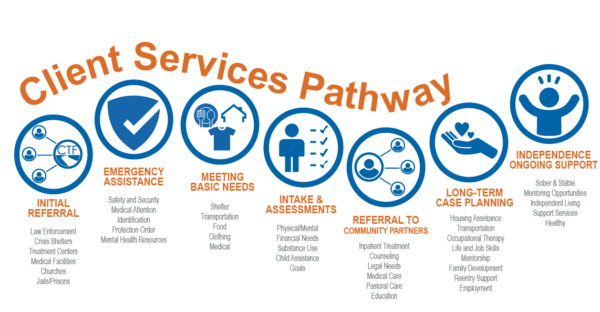Clinical Services Pathway: Intake & Assessments
“I can do all things through Christ who strengthens me.” Philippians 13
The fourth step in CTF’s Client Services Pathway is Intake & Assessments. This includes assessing a client’s history and experiences that led him/her to CTF, physical and mental well-being, financial needs, history of substance use, child assistance needs, and his/her goals.

Of clients who qualified for CTF’s services in 2023, a total of 69% struggled with substance use. Addiction has a complex relationship with human trafficking: it can exacerbate a trafficked person’s vulnerability, be part of a captor’s means of coercing a victim to submit, be part of a captor’s means of incentivizing a victim to remain captive and be used by victims as a mechanism of coping with the physical and mental traumas of being trafficked. Traffickers isolate victims so that they are fully dependent upon them and frequently force their victims to commit crimes during their victimization, including theft, illicit drug production and transport, and prostitution—a tactic referred to as forced criminality. By forcing their victims to commit crimes on their behalf, traffickers not only protect themselves from arrest and conviction but also prevent their victims from seeking and receiving help. Victims fear their own arrest and subsequently may be reluctant to seek help, further isolating the victim from help from their families, communities, authorities, medical staff, and law enforcement or others they might come in contact with. During an intake assessment, CTF gathers information about these and many other experiences a client may have to design a holistic care plan.
CTF staff complete intake assessments to learn more about an individual’s experiences, history, and what supports they are seeking. Staff are specially trained on providing trauma-informed, culturally appropriate, and age-appropriate care, and our intake assessments are adapted from resources from the Office for Victims of Crime and the National Human Trafficking Resource Center. Intake assessments are typically conducted by two staff members, to increase the individual’s comfortability and ensure a care team approach. Put simply, an intake assessment is a conversation between CTF and the client, with the goal of understanding each person’s needs and goals.
Mary, CTF’s Survivor Service & Program Coordinator, Mary underscores the importance of approaching survivors with sensitivity, respecting their autonomy, and prioritizing their well-being. CTF’s intake process is conducted in a safe and supportive environment and informed consent is obtained before discussing clients’ experiences. CTF offers emotional and moral support to all clients to facilitate the healing process without causing further harm.
McKenzie, CTF’s Director of Marissa’s House & Outreach Services, explains how CTF’s service staff gather information during an intake to develop an individualized care plan. For example, if the victim needs inpatient substance abuse treatment, CTF refers them to local partners. Staff may refer clients to supportive group services depending on the client’s needs and goals. “It is the client’s decision to make for their own journey,” McKenzie shares. “We do not have a ‘cookie cutter’ approach—we treat each survivor with the autonomy they deserve.”
Becky Rasmussen, CTF’s President & CEO, notes that every case is new and different, and providing person-centered care is a core value of CTF. She shares: “As a faith-based nonprofit, CTF’s approach is founded upon the core belief that every human life is a gift from God, and each person should be treated with dignity, respect, and empowerment. We never make assumptions about what a client has been through or what they need—we listen. All services are based on the survivor’s needs.”
If you or someone you know needs Call to Freedom’s services, please call (605) 759-3565.
Written By: Kelly Hanzlik
References:

